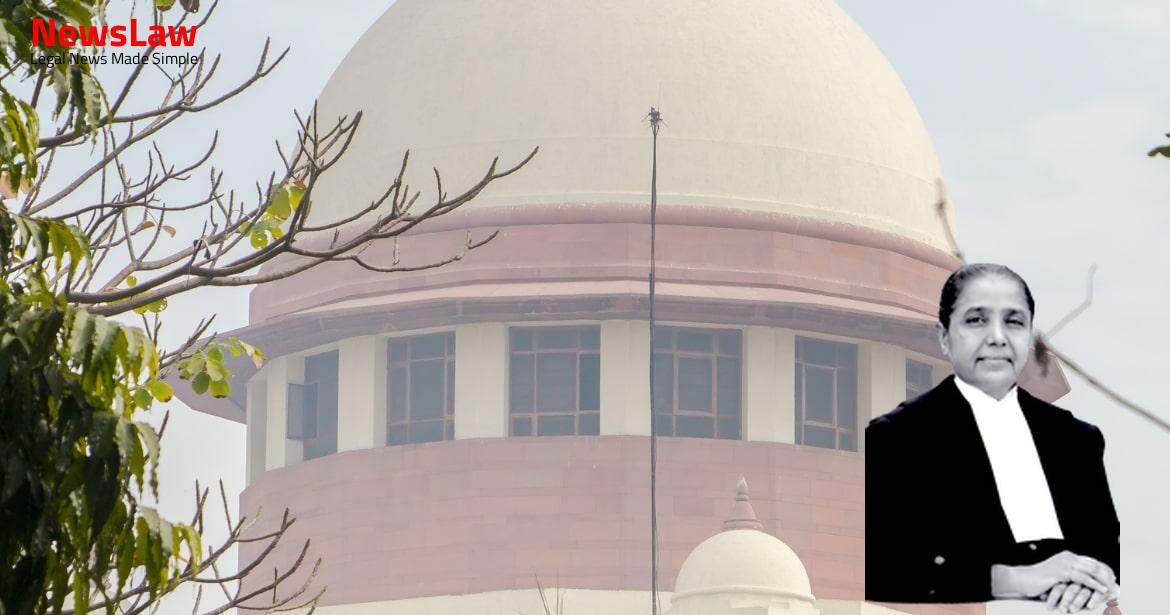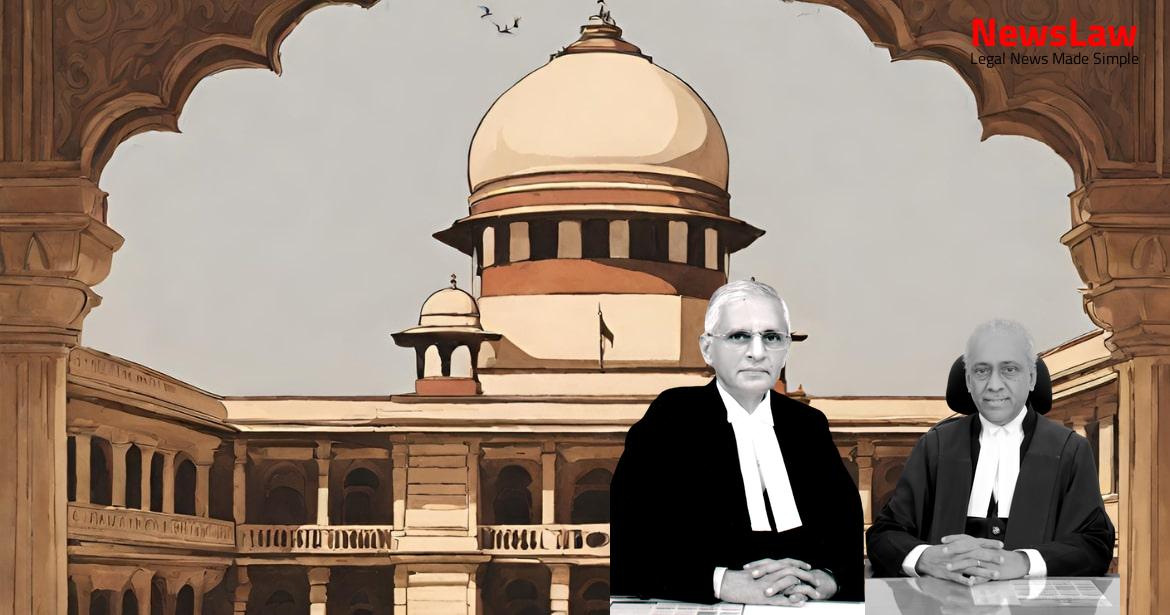In a significant legal case concerning the recruitment of Special Education Teachers under the Government of NCT of Delhi, the Supreme Court Of India addressed the dispute regarding CTET qualification and OBC concession. The case revolves around the eligibility of candidates for General Category vacancies based on their CTET qualification and OBC status. Stay tuned to understand the implications of this ruling on recruitment processes and concession policies.
Facts
- Appellants contended that Respondents cannot avail concession under OBC category as they were permanent residents of other states.
- Respondents could not be considered under unreserved category due to the minimum 60% marks requirement for CTET qualification.
- OA No. 1047 of 2014 was filed by nine Original Applicants before CAT against the Delhi Subordinate Services Selection Board’s decision.
- High Court noted that the Advertisement did not specify eligibility criteria based on CTET marks for General Category vacancies.
- Tribunal upheld decision in favor of Respondents as their performance was deemed more meritorious than others in unreserved category.
- Govt. of NCT of Delhi contended that OBC Certificate for Delhi vacancies must be issued by the Government of Delhi.
- High Court held that once a candidate has obtained CTET qualification, the marks secured in the qualification examination are immaterial for unreserved category vacancies.
- Tribunal’s Order was challenged in High Court by Govt. of NCT of Delhi.
- High Court dismissed the challenge by the appellants in the Writ Petition (C) No 557 of 2019.
- Matter pertains to recruitment of Special Education Teachers under Govt. of NCT of Delhi.
- Tribunal stated that rejection of Original Applicants’ candidature would imply non-recognition of CTET qualification by appellants.
- Original Applicants from OBC Category had acquired CTET qualification with relaxation in qualifying marks from their respective states.
- Appellants argued that despite performance in recruitment test, Respondents’ candidature for General Category vacancies is not valid.
- Applicants were found to be not-eligible for candidature
- Office order dated 19.02.2014 stated the reason as ‘CTET qualified as OBC but OBC outsider’
- The applicants were considered OBC outsiders despite being CTET qualified as OBC
Issue
- Whether respondents with CTET qualification from outside Delhi as OBC candidates with 5% relaxation can be considered for employment as Special Education Teacher in Government of NCT, Delhi
- Whether OBC category respondents can compete for unreserved category seats after availing concession
Also Read: Avitel Post Studioz Ltd. v. HSBC: Enforcement of Foreign Arbitral Award
Arguments
- The appellants challenged the decision of the Delhi High Court, arguing that the respondents who obtained eligibility qualification under relaxed norms for the OBC Category were ineligible for employment in the General Category vacancies in Delhi.
- Ms. Madhavi Divan, the learned Additional Solicitor General of India, contended that the respondents, by securing the eligibility qualification with lower pass marks under relaxed norms for the OBC Category, were rightly found ineligible for General Category vacancies.
- Ms. Divan pointed out that in the present recruitment under Advertisement No.01/13, mere qualification in the CTET (rather than marks) would have a bearing, unlike in the case of Vikas Sankhala (Supreme Court case) where CTET marks influenced the final merit in the selection process.
- She distinguished the recruitment process in Vikas Sankhala from the present case, emphasizing that the CTET was an eligibility qualification in the current matter, whereas CTET marks affected the final selection in the Rajasthan recruitment process discussed in the Vikas Sankhala case.
- Ms. Divan argued that the judgment in Vikas Sankhala was specific to the peculiarities of that recruitment case and its ratio would not be applicable to the present situation involving General Category vacancies.
- Ms. Aishwarya Bhati, the learned Senior Counsel for the respondents argues that if the essential qualification in the advertisement does not stipulate any minimum marks for eligibility, the respondents with CTET qualification cannot be considered ineligible.
- The respondents claim that they obtained higher marks in the recruitment test compared to some candidates selected for the General category vacancies, implying that rejecting their candidature would mean ignoring merit for appointment.
- Ms. Bhati supports the decision of the High Court and the Tribunal, citing that the ratio in Vikas Sankhala (supra) was correctly applied to provide relief to the Original Applicants who seek appointment based on their merit position in the recruitment test.
Also Read: Insurance Claim Repudiation due to Fire Incident: Court’s Legal Analysis
Analysis
- The Vikas Sankhala judgement is discussed in detail due to its relevance to the case.
- In Vikas Sankhala, candidates who obtained CTET qualification with concession faced a disadvantage in the recruitment process.
- The judgement highlighted that no concession is available to reserved category candidates if relaxation is given in pass marks.
- Specific instructions in OMs stated that relaxed standards for reserved candidates would count them against reserved vacancies.
- Contrary to the Rajasthan case, candidates in Vikas Sankhala were allowed to migrate to the unreserved category.
- The court observed that balancing factors were needed for fair treatment, which was absent in the present case.
- The CAT wrongly applied the Rajasthan case judgement to the present case.
- The eligibility for OBC category posts requires certification by the Delhi government, which the respondents lacked.
- Candidates obtaining qualification under relaxed norms for OBC category are ineligible for general category vacancies.
- The principles of reservation must protect the unreserved category to avoid dilution of competence and merit.
- The respondents did not secure the required 60% marks in CTET and were ineligible for the general category vacancies.
- The recruitment process in Vikas Sankhala differed from the present case, where migration to unreserved category vacancies was allowed based on merit.
- The OMs emphasize that SC/ST/OBC candidates selected on the same standards as general candidates should not be adjusted against reserved vacancies.
- Concessions for disadvantaged categories must align with reservation policies according to the guidelines.
- The respondents did not have OBC certification from Delhi and thus were deemed ineligible for reserved category vacancies.
- Allowing the respondents to compete for open category vacancies based on relaxed norms would not be permissible.
- The reservation benefits under Clause 6(iii) of Advertisement No.1/13 impacted the standards of competence and merit in the recruitment process.
- The recruitment in Vikas Sankhala allowed migration to unreserved category vacancies for candidates securing CTET qualification with concession.
- The OMs emphasize the importance of protecting the unreserved category and considering the specific characteristics of the present case.
- Circular dated 11.05.2011 issued by the Department of Personnel, government of Rajasthan allowed migration to the unreserved category.
- Migration was permitted irrespective of any concession availed by the reserved category candidate if they scored higher marks than the last selected Unreserved category candidate.
- The interpretation of Vikas Sankhala case without its peculiar facts would lead to dilution of merit in the unreserved category
- Respondents secured the qualification under relaxed norms, which further supports the dilution of merit argument
- Arguments made by the respondents in favor of their qualification under relaxed norms are rejected
Decision
- The High Court and the Tribunal made an error in granting relief to the respondents.
- The impugned judgment of the High Court of Delhi in Writ Petition (C) No 557 of 2019 dated 21.1.2019 has been set aside.
- The appeal has been allowed with no order as to costs.
Case Title: GOVT. OF NCT DELHI Vs. PRADEEP KUMAR
Case Number: C.A. No.-008259-008259 / 2019



